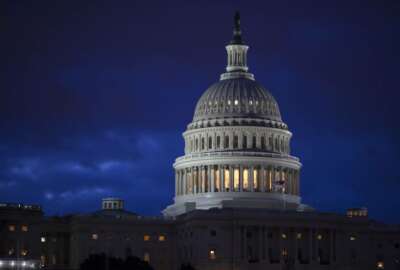With 10 days left until the current continuing resolution expires at the end of the day on Dec. 8, talk of a government shutdown is ramping back up.
Optimists hoping for a deal after a scheduled meeting with President Donald Trump and congressional leaders were let down Tuesday, after the president tweeted, “I don’t see a deal!” and House Minority Leader Nancy Pelosi (D-Calif.) and Senate Minority Leader Chuck Schumer (D-N.Y.) canceled their meeting at the White House.
Congressional aides say the most likely scenario is another two-week extension in December, which would give lawmakers more time to negotiate an omnibus spending bill and raise spending caps set under the Budget Control Act of 2011.
“We hope that whatever final deal is reached, it restores agencies’ funding to levels that provide for smooth and adequate operations for our 326 ports of entry, the appropriate policing of the financial and banking system, an efficient and effective tax collection process, strong enforcement of environmental laws and many other vital government services,” National Treasury Employees Union President Tony Reardon said in a statement last week.
But in the event Congress can’t avert a government shutdown, here are four things to remember.
Federal employees can also find the Office of Personnel Management’s guidance for shutdown furloughs, which it last updated in 2015.
Employees at the Defense Department should also check DoD’s own procedures in the event of a government shutdown.
You’ll probably still get paid
Federal employees furloughed during the shutdown in 2013 did receive back pay for the 16 days the government remained closed. Congress included a provision in its October 2013 spending bill that reopened the government and authorized that furloughed employees receive “their regular standard rate of compensation for the period of such lapse in appropriations, as soon as practicable.”
If similar events occur at the end of the week, several congressmen have already said they want to make sure federal employees get paid.
Lawmakers have introduced various pieces of legislation to make sure federal employees receive compensation if furloughed for any period of time where there’s a lapse in appropriations.
Reps. Don Beyer (D-Va.) and Rob Wittman (R-Va.) introduced the Federal Employee Retroactive Pay Fairness Act, which will guarantee that federal employees receive back pay in the event Congress can’t come to an agreement on a funding solution.
“Federal employees should not suffer because Congress refuses to end its govern-by-crisis mentality,” Wittman said in an April 24 statement. “Preparing the retroactive pay legislation sends a signal to our federal workers that they won’t be forgotten in the unfortunate event of a shutdown. While this legislation minimizes the impacts of funding uncertainty, my focus remains on returning Congress to a regular schedule of budgeting and passing appropriations bills.”
It’s similar to a bill Sen. Ben Cardin (D-Md.) introduced in April that would also ensure that federal employees get paid in the event of a government shutdown.
‘Excepted’ positions
Federal employees who perform “emergency work involving the safety of human life or the protection of property” or other types of work will be “excepted” from shutdown furloughs.
Otherwise, federal employees whose salaries are funded through annual appropriations will be asked not to work.
Since most political appointees are not subject to furloughs, because they are not part of the Title 5 leave system, most will continue to work during a shutdown.
Typically, agency legal counsels and senior managers designate who serves in “excepted” or “non-excepted” functions. Individual agencies have more details on this topic in their contingency plans, though most haven’t been updated since September 2015.
Each agency will generally decide when and how it will notify employees of their status. “Excepted” employees who work during a government shutdown will generally get paid after Congress passes and the president signs another continuing resolution or appropriations package.
Your health benefits will continue
Federal employees will continue to receive their health benefits even if their agency doesn’t make premium payments on time.
“Since the employee will be in a non-pay status, the enrollee share of the [Federal Employee Health Benefits Program] premium will accumulate and be withheld from pay upon return to pay status,” OPM wrote in its shutdown guidance.
Furloughed employees enrolled in the Federal Employees’ Group Life Insurance (FEGLI) Program can continue to receive coverage for 12 consecutive months without cost to the worker or the agency.
Coverage will continue for enrollees in the Federal Long Term Care Insurance Program as long as premiums are paid, but automatic payroll deductions will stop for furloughed employees.
“If Long Term Care Partners does not receive payment for three consecutive pay periods, they will begin to direct bill the enrollee,” OPM said. “The enrollee should pay premiums directly billed to him/her on a timely basis to ensure continuation of coverage.”
Federal retirees under both the Federal Employees Retirement System (FERS) and Civil Service Retirement System (CSRS) will continue to receive scheduled annuity payments.
The Thrift Savings Plan will operate as normal during a government shutdown. Furloughed employees enrolled in the TSP will be able not to make contributions to the plan while they’re not getting paid. TSP participants can request a financial hardship withdrawal, though certain conditions apply.
Costly and unproductive
Both Congress and the Trump administration have their own political reasons for averting a government shutdown in the coming days, but past shutdowns point to other, practical ones as well.
During the last government shutdown in 2013, federal employees collectively missed 6.6 million days of work, according to Office of Mangement and Budget estimates. The 16-day shutdown cost the government roughly $2.5 billion in lost productivity.
The Defense Department lost the most days, 1.6 million, followed by the departments of Treasury (985,000), Agriculture (737,000) and Interior (646,000).
Copyright
© 2024 Federal News Network. All rights reserved. This website is not intended for users located within the European Economic Area.

